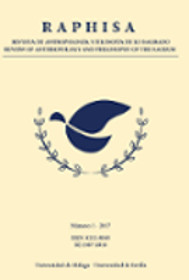Religious Thought in Korea as a Path (dao) of Inclusion and Liberation
DOI:
https://doi.org/10.24310/raphisa.7.2.2023.18323Keywords:
Korea, religions, inclusion, exclusion, liberationAbstract
This article takes a journey through the history of the Korean Peninsula through the paths traveled by the main religious traditions present in it. We will analyze the role they have had in the way of understanding social relations and the creation of mechanisms of inclusion and exclusion within Korean society. The interrelationships established between them are a factor that has contributed to the progress of society and that different groups were accepted or rejected throughout history. We study how the thinking of these religious traditions and the way of understanding them has promoted or hindered the processes of inclusion and liberation throughout the different stages of Korean history.
Downloads
Metrics
References
CAWLEY, KEVIN N. (2019) Religious and Philosophical Traditions of Korea, London: Routledge.
CHANG, CHU-KUN (1988) “An introduction to Korean shamanism”, en GUISSO, RICHARD W.I. y YU, CHAI-SHIN (eds.), Shamanism: The Spirit World of Korea, Berkeley: Asian Humanities Press, pp. 30-51.
GRAYSON, JAMES H. (2002), Korea - A Religious History (Revised edition), New York: RoutledgeCurzon.
GRAYSON, JAMES H. (1985), Early Buddhism and Christianity in Korea. A Study in the Emplantation of Religion, Leiden: E.J. Brill.
HOGARTH, HYUN-KEY K. (2002) Syncretism of Buddhism and Shamanism in Korea. Seoul: Jimoondang Pub. Comp.
HOGARTH, HYUN-KEY K. (1999), Korean Shamanism and Cultural Nationalism, Seoul: Jimoondang Pub. Company.
ILYEON (Ed. Botella, L.A., Kang E.K., Doménech, A.J. y Wulff, Fernando) (2023). Samguk Yusa. Memorias de los Tres Reinos Coreanos, Málaga: UMA Editorial.
KANG, JAE-EUN (2006), The Land of Scholars. Two Thousand Years of Korean Confucianism, Paramus (New Jersey): Homa & Sekey Books.
KIM, ANDREW E. (1995), “A History of Christianity in Korea: From Its Troubled Beginning to Its Contemporary Success”, Korea Journal 35: 2 (Summer 1995), pp. 34-53.
KIM, INHOE (1988), “Korean Shamanism. A Bibliographical Introduction”, en GUISSO, RICHARD W.I. y YU, CHAI-SHIN (eds.), Shamanism: The Spirit World of Korea, Berkeley: Asian Humanities Press, pp. 12-51.
KIM, OK-HUI (1984b), "Women in the History of Catholicism in Korea", Korea Journal 24: 8 (Aug. 1984), pp. 28-40.
KIM, YUNG-CHUNG (ed.) (1976), Women of Korea. A History from Ancient Times to 1945, Seoul: Ewha Womans Univ. Press.
LEE, PETER H. (ed.) (1996), Sourcebook of Korean Civilization Vol. II From the Seventeenth Century to the Modern Period, New York: Columbia University Press.
LEE, PETER H. y DE BARY, WM. THEODORE (eds.) (1997), Sources of Korean Tradition Vol. I. From Early Times through the Sixteenth Century, New York: Columbia University Press.
LEE, YONG-SHIK (2004), Shaman Ritual Music in Korea, Seoul: Jimoondang.
PAI, Hyung-Il (2000), Constructing "Korean" Origins: A Critical Review of Archaeology, Historiography, and Racial Myth in Korean State Formation Theories, Harvard/Hallym Series on Korea, London: Harvard University Press.
YOON, INSHIL-CHOE (2007), “Martyrdom and Social Activism: The Korean Practice of Catholicism”, en BUSWELL, ROBERT E., JR. (ed.), Religions of Korea in Practice, Oxford: Princeton University Press, pp. 355-37
Downloads
Published
How to Cite
Issue
Section
License

This work is licensed under a Creative Commons Attribution 4.0 International License.
License permitted by the journal: Public Domain. Authors retain the copyright and full publishing rights without restrictions.






